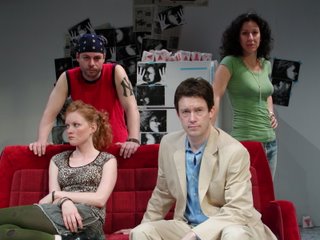The three actors of this tight, witty drama are all great enthusiasts, and their energy is well-tapped by director Mark Brokaw to tell this play of passion (not a Passion play). -----------------------------------------------------------------------------------
(6/23) For a little over two hours,
The Busy World Is Hushed lives up to its title. Not a single cell phone goes off during the performance—it wouldn’t dare. There’s too much life onstage for such a rude interruption, and though I despise theological thinking plays, Keith Bunin never proselytizes—he just uses God as an all-inspiring passion. The three actors of this tight, witty drama are all great enthusiasts (even though Jill Clayburgh is forced to reel it in to play the restrained “bad guy”), and director Mark Brokaw has no problem tapping into all that energy.
So here’s a different sort of passion play: three characters subsumed by different levels of religious zeal, and each for their own reason. Though Bunin’s obviously written a play, there’s no sense of predestination for any of them, and their worlds joyfully, and then tragically, commingle. The first, Hannah (Clayburgh) is the full-on Episcopalian, a minister trying to make the world better, all the while failing to see her own personal hell. Her rival, Thomas, is the traditional rebellious son—wild, agnostic, and self-confident. Brandt, an inhibited but spirited ghostwriter, is the pivotal third, stuck in the middle after being hired to help complete Hannah’s discourse of a newly discovered gospel.
Brandt is in turmoil because his father has an inoperable brain tumor, but he falls in love with Thomas’s world-wizened ways anyway, and begins dating him after some surprising encouragement from Hannah. Then again, perhaps not so surprising, given Hannah’s role as a friendly manipulator who hides her own staggering hurt behind a religious shield. As the play continues, Hannah’s callous chessmanship seems perfectly natural—shouldn’t a mother try to prevent her son from following too far in his suicidal father’s footsteps? And that, perhaps, is the most revelatory moment of
The Busy World Is Hushed: how perfectly normal it all seems. These are real characters: you prick them, and they do bleed.
This is truest of Hamish Linklater, who plays Brandt. Though Brant uses the classic loner act to bolster himself—sarcasm and self-deprecation—Linklater finds all the little movements, shifts, or pauses that expose, ever so slightly, all the cracks. We watch him bloom in his relationship with Thomas, and when he finally breaks, it’s like watching all the groundwork come to fruition. As for Thomas, he is such a rebel that in lesser hands, his charisma steals every scene (and thereby ruins the dynamic of the show). As played by Macfarlane, the role instead becomes that of the invaluable player on the court who takes one for the team with an assist rather than a slam-dunk.
One of Bunin’s themes is that notorious contradiction: why would a loving God allow there to be such pain? Wisely, he doesn’t take a stance. He steps back and allows his characters to show both sides, and their balanced treatment does more for religion than a million angry voices. (Bunin’s beautiful, beautiful prose doesn’t hurt his cause: “All souls are forged in pain, and burnished in death.”)
The Busy World Is Hushed is one more reason never to sacrifice character for politics, and a reminder that the quiet are often louder than the shrill.
[
Aaron Riccio]
-------------------------------------------------------------------Playwrights Horizons (416 West 42nd Street)Tickets (212-279-4200): $65.00Schedule: Tuesday-Saturday @ 8:00; Saturday/Sunday @ 2:30; Sunday @ 7:30



